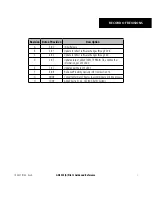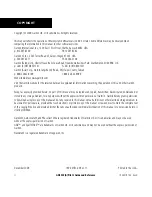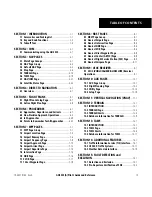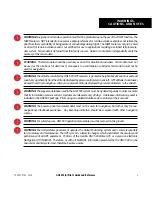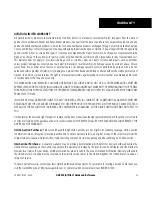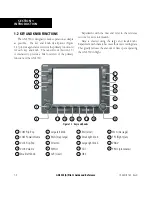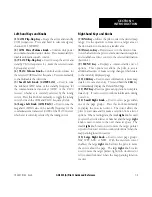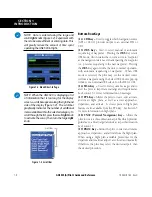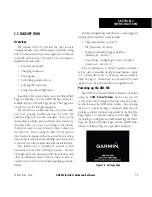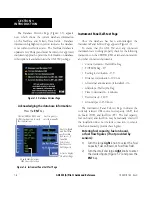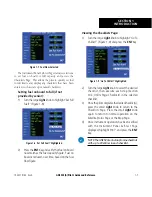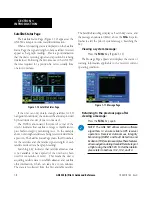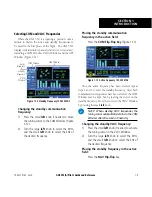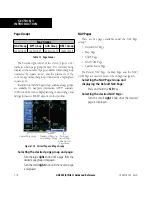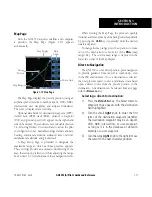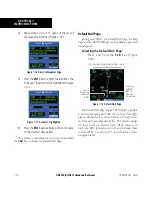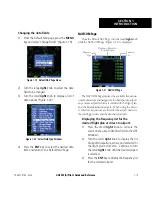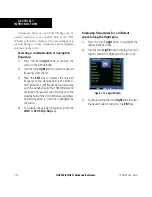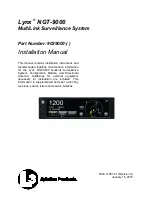
GNS 530(A) Pilot’s Guide and Reference
190-00181-00 Rev. H
vii
WARRANTY
AVIATION LIMITED WARRANTY
All Garmin avionics products are warranted to be free from defects in materials or workmanship for: two years from the date of
purchase for new Remote-Mount and Panel-Mount products; one year from the date of purchase for new portable products and any
purchased newly-overhauled products; six months for newly-overhauled products exchanged through a Garmin Authorized Service
Center; and 90 days for factory repaired or newly-overhauled products exchanged at Garmin in lieu of repair. Within the applicable
period, Garmin will, at its sole option, repair or replace any components that fail in normal use. Such repairs or replacement will be
made at no charge to the customer for parts or labor, provided that the customer shall be responsible for any transportation cost.
This warranty does not apply to: (i) cosmetic damage, such as scratches, nicks and dents; (ii) consumable parts, such as batteries,
unless product damage has occurred due to a defect in materials or workmanship; (iii) damage caused by accident, abuse, misuse,
water, flood, fire, or other acts of nature or external causes; (iv) damage caused by service performed by anyone who is not an
authorized service provider of Garmin; or (v) damage to a product that has been modified or altered without the written permission of
Garmin. In addition, Garmin reserves the right to refuse warranty claims against products or services that are obtained and/or used
in contravention of the laws of any country.
THE WARRANTIES AND REMEDIES CONTAINED HEREIN ARE EXCLUSIVE AND IN LIEU OF ALL OTHER WARRANTIES, WHETHER
EXPRESS, IMPLIED OR STATUTORY, INCLUDING ANY LIABILITY ARISING UNDER ANY WARRANTY OF MERCHANTABILITY OR FITNESS
FOR A PARTICULAR PURPOSE, STATUTORY OR OTHERWISE. THIS WARRANTY GIVES YOU SPECIFIC LEGAL RIGHTS, WHICH MAY VARY
FROM STATE TO STATE.
IN NO EVENT SHALL GARMIN BE LIABLE FOR ANY INCIDENTAL, SPECIAL, INDIRECT OR CONSEQUENTIAL DAMAGES, WHETHER
RESULTING FROM THE USE, MISUSE OR INABILITY TO USE THE PRODUCT OR FROM DEFECTS IN THE PRODUCT. SOME STATES DO
NOT ALLOW THE EXCLUSION OF INCIDENTAL OR CONSEQUENTIAL DAMAGES, SO THE ABOVE LIMITATIONS MAY NOT APPLY TO
YOU.
Garmin retains the exclusive right to repair or replace (with a new or newly-overhauled replacement product) the product or software
or offer a full refund of the purchase price at its sole discretion. SUCH REMEDY SHALL BE YOUR SOLE AND EXCLUSIVE REMEDY FOR
ANY BREACH OF WARRANTY.
Online Auction Purchases:
Products purchased through online auctions are not eligible for warranty coverage. Online auction
confirmations are not accepted for warranty verification. To obtain warranty service, an original or copy of the sales receipt from the
original retailer is required. Garmin will not replace missing components from any package purchased through an online auction.
International Purchases:
A separate warranty may be provided by international distributors for devices purchased outside the
United States depending on the country. If applicable, this warranty is provided by the local in-country distributor and this distributor
provides local service for your device. Distributor warranties are only valid in the area of intended distribution. Devices purchased in
the United States or Canada must be returned to the Garmin service center in the United Kingdom, the United States, Canada, or
Taiwan for service.
To obtain warranty service, contact your local Garmin Authorized Service Center. For assistance in locating a Service Center near you,
visit the Garmin Website at ‘http://www.garmin.com’ or contact Garmin Customer Service at 800-800-1020.
Summary of Contents for GNS 530
Page 1: ...GNS 530 A Pilot s Guide and Reference ...
Page 2: ......
Page 10: ...GNS 530 A Pilot s Guide and Reference 190 00181 00 Rev H viii WARRANTY Blank Page ...
Page 116: ...GNS 530 A Pilot s Guide and Reference 190 00181 00 Rev H SECTION 6 PROCEDURES 6 34 Blank Page ...
Page 142: ...GNS 530 A Pilot s Guide and Reference 190 00181 00 Rev H 7 26 SECTION 7 WPT PAGES Blank Page ...
Page 286: ...GNS 530 A Pilot s Guide and Reference 190 00181 00 Rev H I 6 INDEX ...
Page 287: ......



